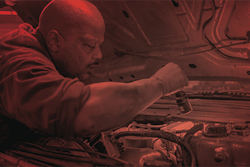Truck, trailer and semitrailer chassis and bodies and tractors earned the IRS more than $5 billion in 2022, the latest year for which data is available. It’s a sliver of that year’s $95 billion in total excise tax collections.
For truck and equipment dealers, though, the federal excise tax (FET) can mean a big headache and a serious risk to their bottom lines, especially if there’s an audit and more so if unexpected liability is uncovered.
And while there’s not one particular thing that triggers an audit, audits do happen, say Ericka Hernandez and Matt Brown with FORVIS. Hernandez and Brown will lead an FET webinar for Trucks, Parts, Service on May 22.
Tim Reynolds, CPA, a partner with Davidson, Holland, Whitesell and Co., says dealing with an FET-focused audit from the IRS can come with its own set of pitfalls, some of which can be cleared up by using FET best practices in your dealership and conducting regular self-audits.
The best thing to keep in mind, Reynolds says, is IRS agents “look through a straw.” Everything is black and white, right or wrong. Any misstep in FET paperwork or calculations is an entry point for liability.
Brown and Hernandez say there are some things that may draw the IRS’ attention. These are having errors on the FET return; importing trucks, trailers and tractors and not paying the tax at first retail sale; or perhaps having a customer get audited.









